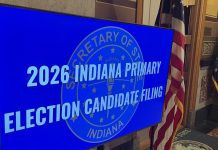As the former president of Vincennes University and Speaker of the Indiana House of Representatives, I have come to know personally hundreds of Hoosier veterans and I, and all Hoosiers, have deep respect and gratitude for their service. I was pleased to see that the Indiana General Assembly recently passed a number of bills related to Hoosier men and women who have served or are currently serving in the military and their families. However, as I talk to veterans around the state I hear that these bills do not address the major issues faced by our veteran’s community and while Indiana will always be a patriotic state, we can and must do more for our military families.
Hoosier veterans are a resource that we must do a better job of cultivating. Veterans are motivated, hardworking and bring unique skills to our state. They should be at the very heart of our efforts to strengthen the economy, revive our state’s manufacturing sector and adapt to a globalized 21st century marketplace economy. Currently, Indiana is ranked 46th in the nation for veterans receiving the benefits they earned—primarily because of not knowing what benefits are available or how to access them. A recent survey also ranked Indiana dead last, 51st in the country, for military retirees. This survey was based on three metrics: “economic environment,†“quality of life†and “health care.â€
What does this all mean?
It means that veterans are leaving Indiana. Between 2013 and 2014 Indiana saw a 65 percent increase in the number of veterans who left for other states. We must turn this around. We need to get serious about working to attract and retain veterans in Indiana and, as Indiana’s next governor, I will make this a top priority of my administration.
So how do we do this?
Many, if not most, of the benefits veterans earned during their service are federal benefits so first and foremost, as governor, I will work with our members of Congress and federal administration officials to make sure they understand the needs of Hoosier veterans. Currently, Indiana based Veterans Administration claims have an average wait time of 226 days, the 8th poorest performance in the country. This is simply unacceptable. I will urge our federal representatives to enact innovative approaches like full “freedom of choice,†which could allow veterans to access private health care services closer to home. It just doesn’t make sense that veterans in Northwest Indiana have to waste an entire day traveling to Chicago to see a doctor because that is the closest VA hospital. We should be able to find better, more efficient and convenient ways to serve them.
Here in Indiana we need to do a number of things. The Indiana Department of Veteran’s Affairs must do a better job of reaching out to veterans and do more to support our county veterans service officers—the folks that are on the front lines of helping Hoosier veterans access their benefits. Indiana should create state level veterans service officers to support county officers who are stretched thin by high caseloads. We should support organizations like the Veterans of Foreign Wars and American Legion who take it upon themselves to help their fellow veterans when county service officers are unable. We also need to make sure there are more women veteran service officers who understand the specific needs and benefits associated with Indiana’s 35,000 women veterans. Increasing the amount of benefits received by our veterans by just 10 percent, a completely reasonable number, would inject more than $853 million dollars into the Hoosier economy.
We will also eliminate the current duplication of job placement services being offered by both the Indiana Department of Veterans Affairs and the Indiana Department of Workforce Development. We will take a look at what’s working in the current system and strengthen it, and reform what’s not working, so that our job placement programs are able to better address the specific needs of our veterans and highlight the unique skills that they offer Indiana employers.
Finally, Indiana must do a better job of addressing the health and safety needs of veterans including working to reduce veteran’s homelessness and making the prevention of veteran suicide a priority. I will create a dedicated veteran suicide hotline and we will make sure that local officials are trained on how to address emergency situations and recognize the warning signs of suicide or family crisis.
If I am honored to serve as the governor of this great state, I pledge that every morning when I wake up I will say, “Our veterans have served us, are we doing everything we can today to serve them?†Over the coming weeks my team and I will continue to sit down with Hoosier veterans, learn about their needs and, then, lay out my vision for how we make Indiana the most pro-veteran state in the country.





Being classified as a disabled war veteran (my disability is nothing that limits me in any way/ I served in a “combat” zone in wartime, but I’m not a combat vet), I don’t take advantage of many veterans benefits. I have had a long successful career as a public servant since. I am able to provide my own health care. I am embarrassed to say that I do get a monthly check for my disability. I have bought 2 homes using VA loans. I’d hate to use veterans resources that could be spent on the small percentage of vets that have seen actual combat.
I think that a way to make Indiana a better place for veterans, we should consider income tax breaks for veterans who have actually fought. I would be happy to see any real combat vet never pay a dime of state or federal income tax for as long as they live. I think veterans of all kinds should be tax exempt once they retire – regardless of whether they retire from the military or the workforce.
Such a move on Indiana’s part would make the state a more attractive place to live for veterans from around the country.
Damn.
Honesty is always so impressive….
By the way, thank you veteran. I just thank God you’re here to voice your opinion….
Comments are closed.